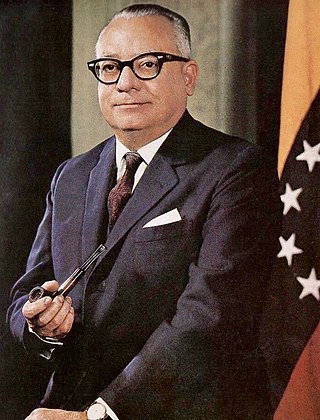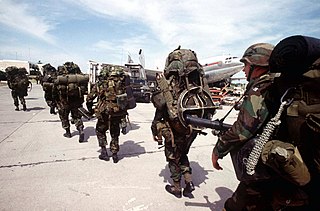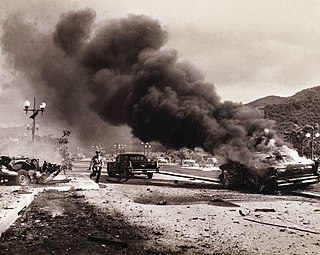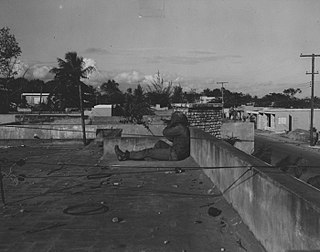
The Organization of American States is an international organization founded on 30 April 1948 to promote cooperation among its member states within the Americas.

The United Nations Security Council (UNSC) is one of the six principal organs of the United Nations (UN) and is charged with ensuring international peace and security, recommending the admission of new UN members to the General Assembly, and approving any changes to the UN Charter. Its powers as outlined in the United Nations Charter include establishing peacekeeping operations, enacting international sanctions, and authorizing military action. The UNSC is the only UN body with authority to issue resolutions that are binding on member states.

Rómulo Ernesto Betancourt Bello, known as "The Father of Venezuelan Democracy", was a Venezuelan politician who served as the president of Venezuela, from 1945 to 1948 and again from 1959 to 1964, as well as leader of the Democratic Action, Venezuela's dominant political party in the 20th century.

United Nations Security Council Resolution 678 was adopted on 29 November 1990. After reaffirming resolutions 660, 661, 662, 664, 665, 666, 667, 669, 670, 674 and 677, the council noted that despite all the United Nations efforts, Iraq continued to defy the Security Council.

The Conferences of American States, commonly referred to as the Pan-American Conferences, were meetings of the Pan-American Union, an international organization for cooperation on trade. James G. Blaine, a United States politician, Secretary of State and presidential contender, first proposed establishment of closer ties between the United States and its southern neighbors and proposed international conference. Blaine hoped that ties between the United States and its southern counterparts would open Latin American markets to US trade.

Despite being a founding member of the Organization of American States (OAS), Cuba was effectively suspended from 31 January 1962 to 3 June 2009. Thus, for almost the entire time that the OAS has been operating, Cuba has been barred from sending representatives to the OAS and effectively had its membership suspended. It was not until 3 June 2009 that foreign ministers of OAS member countries assembled for the OAS's 39th General Assembly in San Pedro Sula, Honduras, passed a vote to lift Cuba's suspension from the OAS.

United Nations Security Council Resolution 144, adopted on July 19, 1960, acknowledging that the situation existing between Cuba and the United States was growing more tense but also that it was the subject of ongoing debate inside the Organization of American States, the council decided to delay action on the matter until receiving a report from the OAS. The council urged all other States to refrain from any action which might increase the existing tensions between the two nations.
United Nations Security Council Resolution 386, adopted unanimously on March 17, 1976, noted statements made by the President and Minister for Foreign Affairs of the People's Republic of Mozambique and also expressed its concern regarding the situation created by the provocative, aggressive acts committed by the illegal minority regime in Rhodesia. The Council reaffirmed their earlier work regarding Rhodesia, including their resolutions imposing sanctions on that country and noted their appreciation with Mozambique's co-operation with that plan. The Resolution then condemns Rhodesia's aggressive acts, including military incursions, against Mozambique and noted the urgent and special economic need of Mozambique who arose from its implementation of resolution 253.

United Nations Security Council resolution 939, adopted on 29 July 1994, after recalling all relevant resolutions on Cyprus, the Council discussed the implementation of confidence-building measures as part of a wider process to settle the Cyprus dispute.

United Nations Security Council Resolution 944, adopted on 29 September 1994, after recalling resolutions 841 (1993), 861 (1993), 862 (1993), 867 (1993), 873 (1993), 875 (1993), 905 (1994), 917 (1994), 933 (1994) and 940 (1994), the Council affirmed its willingness to suspend sanctions against Haiti once the legitimate President Jean-Bertrand Aristide had returned following the removal of the military junta.

United Nations Security Council resolution 1372, adopted on 28 September 2001, after recalling resolutions 1044 (1996), 1054 (1996) and 1070 (1996) concerning the assassination attempt on Egyptian President Hosni Mubarak at an Organisation of African Unity (OAU) summit in the Ethiopian capital Addis Ababa on 26 June 1995 and subsequent measures, the Council noted compliance by Sudan and terminated sanctions against the country.
Ignacio Luis Arcaya Rivero, was a Venezuelan lawyer and politician. He was one of the signatories of the Puntofijo Pact on behalf of his party, the Democratic Republican Union (URD).

International reactions to the annexation of Crimea by the Russian Federation have largely been condemnatory of Russia's actions, supportive of Ukraine's sovereignty and territorial integrity, and supportive of finding a quick end to the crisis. The United States and the European Union responded by enacting sanctions against Russia for its role in the crisis, and urged Russia to withdraw. Russia accused the United States and the EU of funding and directing the revolution and retaliated to the sanctions by imposing its own.

United Nations Security Council Resolution 2231 was a 20 July 2015 resolution endorsing the Joint Comprehensive Plan of Action on the nuclear program of Iran. It sets out an inspection process and schedule while also preparing for the removal of United Nations sanctions against Iran. The 15 nations on the Security Council unanimously endorsed the resolution, which had been negotiated by the permanent members of the United Nations Security Council—China, France, Russia, the United Kingdom, and the United States—plus Germany, the European Union, and Iran.

A United Nations Secretary-General selection was held in 1953 after Trygve Lie announced his intention of resigning. Lie had been at odds with the Soviet Union since the outbreak of the Korean War, and the negotiations for an armistice offered the opportunity for a new Secretary-General to turn the page. The British delegation dragged out the selection process as they campaigned for Lester Pearson of Canada, but he was vetoed by the Soviet Union. Other candidates fell short of a majority in the Security Council. After two weeks of deadlock, France proposed Dag Hammarskjöld of Sweden as a dark horse candidate. Hammarskjöld was acceptable to both superpowers and was selected Secretary-General for a 5-year term.

On 24 June 1960 there was an assassination attempt against Venezuelan President Rómulo Betancourt, ordered by the Dominican dictator Rafael Leónidas Trujillo.

The Mission of the Representative of the Secretary-General in the Dominican Republic (DOMREP) was a peacekeeping operation established in 1965 by the UN to observe the ceasefire agreement between the two de facto authorities in the Dominican Republic during the Dominican Civil War. DOMREP was instructed to report any breaches of the agreements between the Constitutionalists led by Juan Bosch and Francisco Caamaño, and Loyalists commanded by Elías Wessin y Wessin and backed by the United States. Once the new Dominican constitutional government was formed, DOMREP withdrew.















